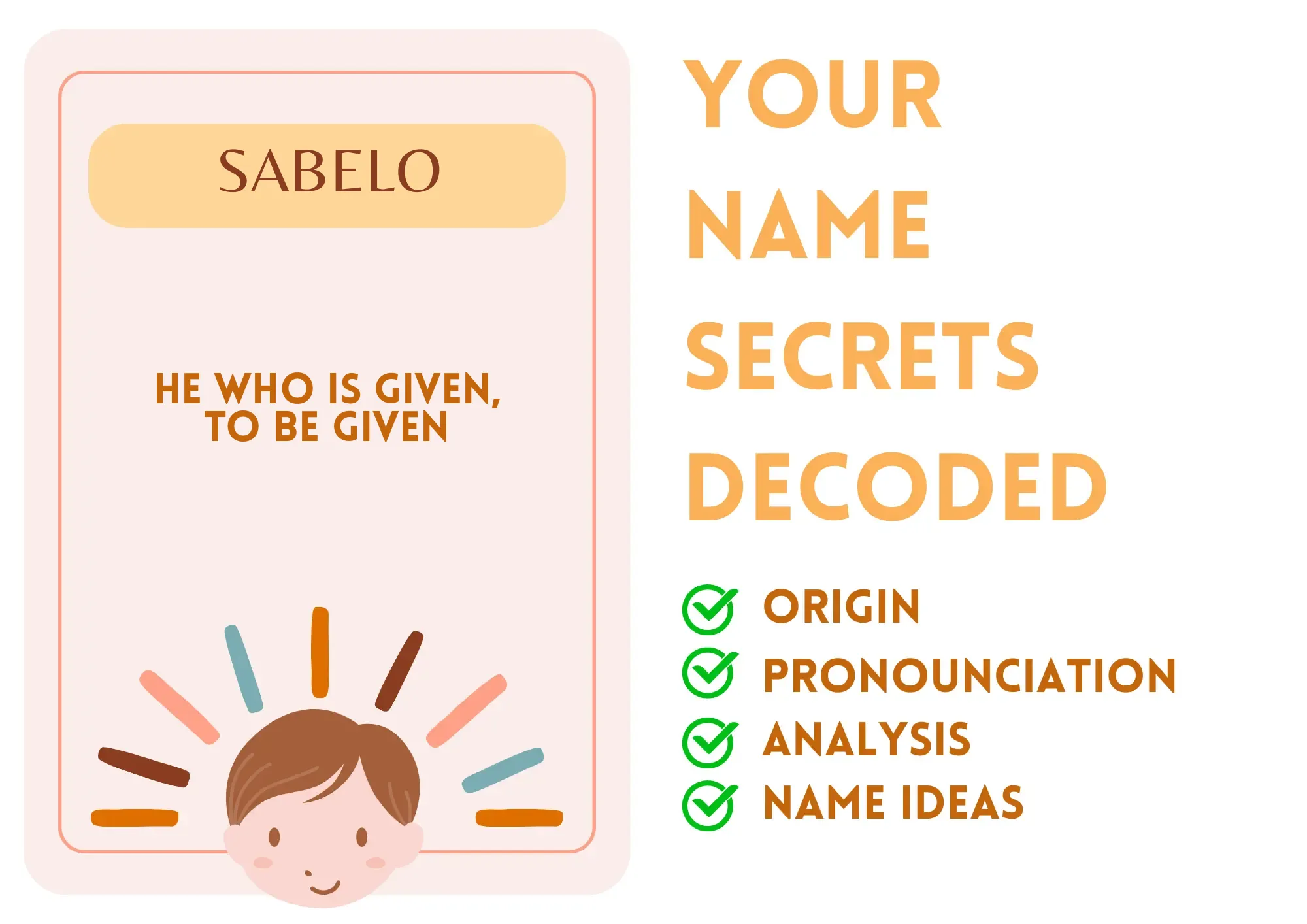
Sabelo
Sabelo is a name of rich cultural significance primarily used in Southern Africa, especially among Zulu speakers. It translates to 'he who is given' or 'to be given,' reflecting an appreciation for blessing and gratitude. Sabelo is predominantly a masculine name, associated with strength and grace.
The name holds a significant place in Zulu culture and is often used in contexts where a child is seen as a precious gift, thus contributing positively to familial and community bonds.
In adventure and depth, Sabelo represents hope, appreciation, and the spirit of generosity. It tends to evoke positive feelings, appreciated for its meaning and uniqueness.
Basic Information
Gender: Boy
Sounds Like: sah-BEH-loh
Pronunciation Explanation: The emphasis is on the second syllable 'BEH', producing a rhythmic flow.
Summary and Meaning
Meaning: he who is given, to be given
Origin: Sabelo originates from the Zulu people of South Africa, with its roots deeply embedded in the local language and culture.
Usage: Sabelo is traditionally a masculine name and largely associated with male identity in Zulu culture.
Name Number (Chaldean)
Name Number (Pythagorean)
Popularity (Global Rank)
Overall: 9153
Boys: 18696
Most Popular in
Religious and Cultural Significance
Religion: Zulu Spirituality
Background: In Zulu culture, names have deep spiritual and familial ties, often connected with ancestral reverence.
Cultural Significance: Sabelo reflects a cultural appreciation of life as a gift, often celebrated within family circles during naming ceremonies and rites.
Historical Significance: Sabelo serves as a testament to the values held by Zulu communities, emphasizing the importance of kindness, generosity, and deep familial love through its meaning.
Popular Culture
Literature and Mythology: Sabelo appears in various forms of African literature, often representing the connection to ancestors and the significance of personal names.
Movies and Television: Characters bearing the name Sabelo are featured in South African films and series, typically embodying resilience and positivity.
Feelings and Perceptions
Perception: Sabelo is generally perceived positively in its culture, associated with meaningfulness, strength, and the spirit of generosity. It resonates with parents seeking a name filled with substance.
Positive Feelings: Unique, meaningful, strong, gracious, kind, and a gem of cultural heritage.
Negative Feelings: Might be challenging for non-native speakers to pronounce correctly at first.
Practical Considerations
Ease of Writing and Calling: Sabelo is straightforward to write and pronounce. It consists of six letters and three syllables, making it quite memorable.
Common Typos and Misspellings: Sabello,Sabeloh,Sabelo,Sabele
Common Nicknames: Sabe,Belo,Sabz
Sabelo Popularity
Sabelo Usage and Popularity By Country
| Country | Rank (Overall) |
|---|---|
| South Africa | 258 |
| Zimbabwe | 1509 |
| Iceland | 1972 |
| Zambia | 2702 |
| Norway | 4111 |
| Cuba | 5913 |
| United Kingdom | 7204 |
| Haiti | 7504 |
| Namibia | 8950 |
| Australia | 8973 |
Sabelo Usage and Popularity By City
| City | Rank (Overall) |
|---|---|
| Johannesburg | 310 |
| Durban | 65 |
| Cape Town | 900 |
| Richards Bay | 17 |
| Nelspruit | 35 |
| Newcastle | 370 |
| Witbank | 154 |
| Pretoria | 170 |
| Vryheid | 6 |
| Pietermaritzburg | 16 |
Compatibility Analysis
Famous Persons Named Sabelo
Related Names
Similar Sounding Names:
Abelo,Isabelo,Zabelo,Sable